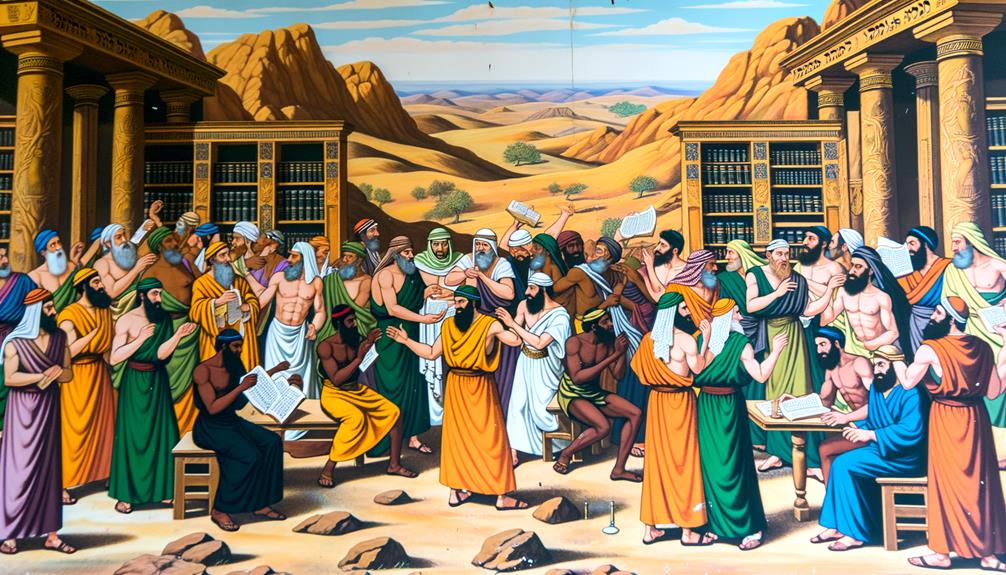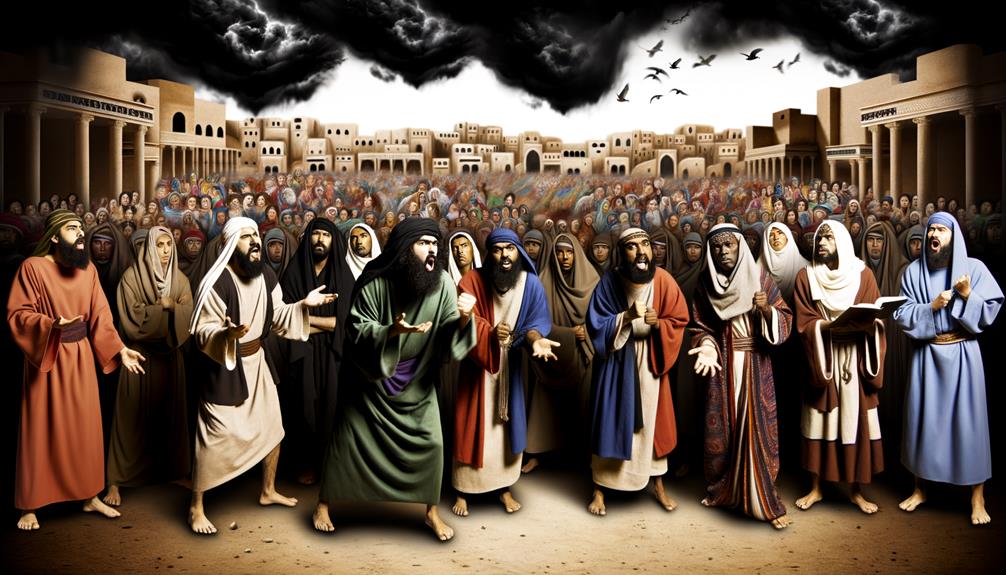Resist Meaning in the Bible: Standing Firm in Faith
In the Bible, resistance is multifaceted, involving obedience to God, rejection of idolatry, and moral courage against evil. The Old Scripture views, such as Exodus 23:24 and Deuteronomy 13:4, emphasize loyalty to divine laws.
In Exodus, Moses’ confrontations with Pharaoh epitomize resistance against systemic oppression (Exodus 5:1). The Psalms, written amid crises, highlight spiritual fortitude (Psalm 27:3, 46:1).
In the New Scripture, Jesus’ teachings promote non-violence (Matthew 5:39) and overcoming temptation (Matthew 4:1-11). Apostolic writings, including James 4:7, counsel steadfast faith and ethical living.
Explore these themes to uncover deeper theological insights.

Resist Meaning in the Bible: Spiritual Warfare and Faithful Stand
| Biblical Reference | Meaning of “Resist” | Context and Insight |
|---|---|---|
| James 4:7 | Opposing the devil | Submit to God and the devil will flee |
| 1 Peter 5:9 | Standing firm in faith | Resist the devil by being steadfast in belief |
| Ephesians 6:13 | Spiritual armor for resistance | Equip yourself with God’s armor to withstand evil |
| Matthew 5:39 | Non-retaliation | Resist not with violence, but respond with peace |
| Hebrews 12:4 | Struggle against sin | Resist sin even to the point of suffering |
Old Testament Views on Resistance

Frequently in the Old Scriptures, the concept of resistance is framed within the context of obedience to God’s commandments and the rejection of idolatry, as illustrated in passages such as Exodus 23:24 and Deuteronomy 13:4. These verses emphasize the need to dismantle altars of false gods and steadfastly adhere to divine laws.
Theological insight reveals that resistance is not merely opposition but an active commitment to uphold God’s sovereignty. Historically, this resistance defined the identity of the Israelites, setting them apart from surrounding nations.
Resisting Evil in Exodus

In the narrative of Exodus, Moses’ confrontation with Pharaoh epitomizes the act of resisting evil, as he demands the liberation of the Israelites from bondage (Exodus 5:1).
The ten plagues serve as divine instruments to undermine Pharaoh’s hardened heart, demonstrating God’s supremacy and justice (Exodus 7-12).
Historically, this resistance not only signifies a struggle for freedom but also underscores a theological assertion of divine intervention against oppressive powers.
Moses’ Stand Against Pharaoh
Moses’ stand against Pharaoh, as chronicled in the book of Exodus, exemplifies a profound theological narrative of resisting systemic evil through divine mandate and moral courage.
Exodus 3:10 records God’s command to Moses, ‘I am sending you to Pharaoh to bring my people the Israelites out of Egypt.’ This divine directive underscores the theological premise of resisting oppressive powers.
Historically, Moses’ confrontation with Pharaoh represents a clash between divine authority and earthly tyranny. His persistence, despite Pharaoh’s obstinacy, illustrates the necessity of unwavering faith and moral fortitude in the face of injustice.
Moses’ resistance is not merely a personal endeavor but a divinely orchestrated mission, reflecting God’s justice and liberation for the oppressed Israelites.
Ten Plagues’ Divine Purpose
The divine orchestration of the Ten Plagues in Exodus serves as a profound demonstration of God’s active resistance against systemic evil and the liberation of His chosen people. Each plague—ranging from the Nile turning to blood (Exodus 7:14-24) to the death of the firstborn (Exodus 12:29-32)—was a calculated act against Pharaoh’s oppressive regime. These plagues illustrated God’s supremacy over Egyptian deities and highlighted His commitment to justice and freedom.
| Plague | Scriptural Reference | Purpose |
|---|---|---|
| Water to Blood | Exodus 7:14-24 | Demonstrate Divine Power |
| Hail | Exodus 9:13-35 | Challenge Egyptian Deities |
| Death of Firstborn | Exodus 12:29-32 | Final Act of Liberation |
This divine resistance underscores God’s relentless pursuit of justice and His unwavering commitment to His covenant people. Throughout history, many have sought meaning in the Bible, drawing inspiration from its teachings to navigate their own struggles and injustices. This pursuit often leads to a deeper understanding of mercy and righteousness, illuminating the path for those who feel marginalized or oppressed. In embracing these divine principles, believers find strength and hope, reinforcing the bond of faith within their communities.
Psalms and Spiritual Resistance

Psalms, often perceived as a collection of heartfelt prayers and hymns, provide profound insights into the theme of spiritual resistance through their exploration of faith, perseverance, and divine protection.
Psalm 46:1 declares, ‘God is our refuge and strength, an ever-present help in trouble,’ emphasizing reliance on divine aid during adversities.
Historically, these poetic scriptures were composed during times of national crisis and personal tribulation, reflecting the Israelites’ resilience.
Psalm 27:3 exemplifies this, stating, ‘Though an army besiege me, my heart will not fear.’
The Psalms underscore a theology of resistance rooted in unwavering trust in God, offering a timeless blueprint for spiritual fortitude.
They remind believers that divine support is paramount in overcoming life’s challenges.
Prophets on Social Injustice

Building upon the theme of spiritual resistance articulated in the Psalms, the biblical prophets vigorously address social injustice, calling for righteousness and equity in the face of systemic oppression.
Prophets like Amos denounce exploitation, declaring, ‘Let justice roll down like waters, and righteousness like an ever-flowing stream’ (Amos 5:24). Isaiah critiques societal inequities, urging, ‘Learn to do good; seek justice, correct oppression’ (Isaiah 1:17).
Historical context reveals these prophets spoke during periods of economic disparity and moral decay, emphasizing that true worship of God requires ethical conduct and social responsibility.
Their messages remain timeless, reminding believers that spiritual resistance encompasses a commitment to justice and advocacy for the marginalized.
Jesus’ Teachings on Resistance

Jesus’ teachings on resistance, encapsulated in directives such as ‘turn the other cheek‘ (Matthew 5:39) and ‘love your enemies‘ (Matthew 5:44), challenge conventional notions of retaliation and hostility.
These principles, set against the backdrop of Roman occupation and Jewish expectation of a militant Messiah, advocate for a radical, non-violent response to oppression.
Turn the Other Cheek
Examining the directive to ‘turn the other cheek’ within Jesus’ teachings reveals a profound approach to resistance that is rooted in non-violence and radical forgiveness, as illustrated in Matthew 5:39.
This Biblical instruction challenges the prevailing ethos of retribution, advocating instead for a form of resistance that dismantles cycles of violence. Historically, this teaching can be seen as a subversive act in a society governed by the lex talionis, the law of retaliation.
| Scriptural Reference | Teaching | Historical Context |
|---|---|---|
| Matthew 5:39 | Non-retaliation | Roman occupation |
| Luke 6:29 | Forgiveness | Jewish-Roman conflicts |
| Romans 12:17 | Overcome evil with good | Early Church disputes |
| 1 Peter 3:9 | Blessing over insult | Persecution of Christians |
This ethos underscores the transformative power of mercy over vengeance.
Love Your Enemies
The concept of loving one’s enemies, as articulated in the Sermon on the Mount, presents a radical form of resistance that subverts conventional notions of enmity and retribution, drawing from passages such as Matthew 5:44 and Luke 6:27.
Jesus’ command to “love your enemies and pray for those who persecute you” challenges the lex talionis, or the law of retaliation. Historically, this teaching emerged in a context where reciprocal justice was the norm.
Instead, Jesus introduced an ethic of transformative love that seeks the well-being of adversaries. This theology underscores a divine love that transcends human limitations, urging believers to mirror God’s boundless mercy.
In doing so, it redefines resistance as an active pursuit of reconciliation and peace.
Resisting Temptation in the Gospels

Within the Gospels, instances of resisting temptation are prominently depicted, providing profound theological insights and scriptural references that underscore the enduring struggle between divine obedience and worldly allurements.
The temptation of Jesus in the wilderness (Matthew 4:1-11, Luke 4:1-13) stands as a seminal narrative, where Christ rebuffs Satan’s offers using scriptural rebuttals, demonstrating the power of divine truth over deceit.
Historical context reveals the wilderness as a place of testing, echoing Israel’s trials. Christ’s resistance not only affirms His divine mission but also models the reliance on God’s word for believers. This struggle in the wilderness serves as a profound reminder of the spiritual battles faced by individuals in their faith journey. The concept of ‘wrestle meaning in biblical context‘ highlights the importance of grappling with doubts and temptations, ultimately leading to spiritual growth and strength. In embracing these challenges, believers can deepen their understanding of God’s promises and their own reliance on Him.
This theological paradigm emphasizes the necessity of spiritual vigilance and unwavering faith in overcoming temptations, providing a timeless guide for Christian conduct. This approach not only highlights the importance of moral discipline but also serves as a reminder of the transformative power of prayer and community support. In this context, believers often seek the “good word meaning in the bible” to deepen their understanding and reinforce their commitment to living a righteous life. By embracing these principles, individuals can cultivate a resilient spirit that thrives amid challenges.
Apostles’ Guidance on Resistance

Apostolic teachings provide a rich tapestry of exhortations and practical wisdom on resisting various forms of spiritual and moral challenges, as exemplified in the epistles of Paul, Peter, and James. Paul advises believers to “put on the full armor of God” (Ephesians 6:11), emphasizing spiritual preparedness.
Peter counsels vigilance, urging, “Be sober, be vigilant” (1 Peter 5:8). Meanwhile, James encourages active resistance, stating, “Resist the devil, and he will flee from you” (James 4:7).
| Apostle | Key Teaching | Scriptural Reference |
|---|---|---|
| Paul | Full armor of God | Ephesians 6:11 |
| Peter | Be sober, be vigilant | 1 Peter 5:8 |
| James | Resist the devil | James 4:7 |
Spiritual Warfare in Ephesians

In addressing the concept of spiritual warfare, Ephesians 6 provides an extensive framework for understanding the defensive and offensive measures believers must undertake to stand firm against the schemes of the devil. This passage, rich in theological insight and scriptural references, underscores the need for spiritual preparedness.
Ephesians 6:10-18 outlines the ‘Armor of God,’ a metaphorical depiction rooted in historical context and apostolic teaching.
Key elements include:
- Belt of Truth – Emphasizes the importance of honesty and integrity (Ephesians 6:14).
- Shield of Faith – Highlights the necessity of steadfast faith to extinguish the flaming arrows of doubt and temptation (Ephesians 6:16).
- Sword of the Spirit – Represents the Word of God as a powerful tool for offense and defense (Ephesians 6:17).
The Book of James on Resisting

The Epistle of James emphasizes the importance of resisting temptation and the devil through a steadfast faith and active submission to God’s will. James 4:7 instructs, ‘Submit yourselves consequently to God. Resist the devil, and he will flee from you’ (ESV). This exhortation is rooted in practical theology, urging believers to align their lives with divine principles.
Historically, James addresses a dispersed Jewish-Christian audience facing trials and temptations, emphasizing that genuine faith manifests in righteous actions. By advocating for humility and resistance against evil, James underscores the necessity of drawing near to God (James 4:8).
Such resistance is not passive but requires conscious effort, reflecting a holistic commitment to living out one’s faith in daily conduct.
Conclusion
The biblical concept of resistance intertwines with spiritual, moral, and social dimensions, revealing a consistent call to stand against evil, injustice, and temptation.
Whether through the deliverance narrative in Exodus, the Psalms’ spiritual fortitude, prophetic calls for justice, or Jesus’ teachings on moral integrity, the Scriptures underscore a divine mandate for resistance.
The apostles’ exhortations and the spiritual warfare depicted in Ephesians further cement this theme.
Coincidentally, the Book of James encapsulates this ethos, urging steadfastness against all forms of opposition.






